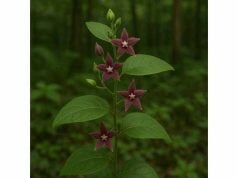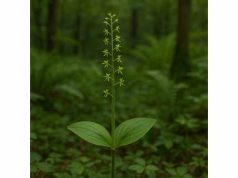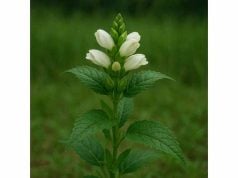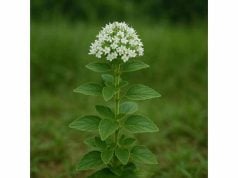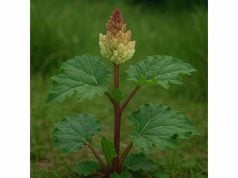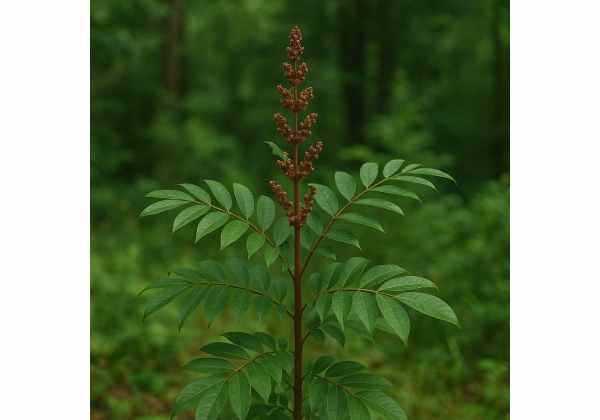
Tongkat Ali, scientifically known as Eurycoma longifolia, is a revered herbal remedy from Southeast Asia that has been used for centuries to enhance vitality and overall wellness. Celebrated for its ability to naturally boost libido, support hormonal balance, and improve energy levels, this traditional herb is rich in bioactive compounds such as eurycomanone, quassinoids, and alkaloids. These constituents are credited with anti-inflammatory, adaptogenic, and cognitive-enhancing properties. As research increasingly validates traditional claims, Tongkat Ali is gaining modern attention for its potential benefits in athletic performance, stress management, and sexual health. This article will offer a comprehensive examination of its botanical identity, phytochemistry, health benefits, applications, and scientific research.
Table of Contents
- Botanical Overview and Identification
- Phytochemical Profile and Active Compounds
- Health Benefits and Essential Qualities
- Applications, Uses, and Safety Precautions
- Scientific Research and Key Findings
- Frequently Asked Questions
Botanical Overview and Identification
Tongkat Ali is a slender, woody herb indigenous to the tropical rainforests of Southeast Asia, particularly Malaysia, Indonesia, and Thailand. Belonging to the Simaroubaceae family, this climbing shrub is well known for its long, spiky roots—highly prized in traditional medicine for their therapeutic properties. The plant’s botanical profile is marked by its distinctive, pinnate leaves, small greenish-yellow flowers, and a robust root system that can extend deep into the soil, enabling it to thrive in nutrient-poor environments.
Taxonomy and Classification
- Family: Simaroubaceae
- Genus: Eurycoma
- Species: Eurycoma longifolia
- Common Names: Tongkat Ali, Malaysian Ginseng, Longjack
This taxonomic grouping reflects its long history as a medicinal plant. The genus Eurycoma is known for containing several species with potent bioactive properties, but E. longifolia is the most widely researched for its adaptogenic and aphrodisiac effects.
Morphological Features
Roots:
The most notable feature of Tongkat Ali is its extensive, gnarled roots, which are harvested for medicinal use. These roots are fibrous, brownish, and have a characteristic bitter taste that is believed to be associated with its potent bioactive compounds.
Leaves:
The leaves are pinnate, comprising multiple small leaflets with a dark green hue. They are arranged alternately along the thin, woody stems, offering a delicate contrast to the rugged appearance of the roots.
Flowers:
The flowers of Tongkat Ali are relatively inconspicuous—small, yellowish-green blooms that appear in clusters. Although not the primary reason for its use, they play a role in the plant’s reproductive cycle and add to its botanical interest.
Growth Conditions:
Tongkat Ali thrives in the humid, tropical climate of Southeast Asia. It prefers well-drained, sandy soils and thrives in partial shade, often growing as an understorey shrub in dense forests. Its resilience in poor soil conditions makes it a valuable crop for sustainable cultivation.
Ecological and Cultural Importance
In its native habitat, Tongkat Ali plays an essential role in the ecosystem. Its extensive root system helps stabilize soil in the forest understory, reducing erosion and contributing to overall land health. Culturally, the herb is deeply embedded in the traditions of indigenous communities, where it has been used in rites of passage, as an aphrodisiac, and as a general tonic to promote strength and virility. Ancient texts and oral histories recount its revered status, and today it continues to be a symbol of health and masculine potency in many Southeast Asian cultures.
Phytochemical Profile and Active Compounds
The efficacy of Tongkat Ali is largely attributed to its diverse phytochemical composition. Over decades of traditional use and modern research, a range of bioactive compounds have been identified that work synergistically to produce its therapeutic effects. These compounds not only support physical energy and libido but also offer benefits for stress reduction, cognitive function, and overall hormonal balance.
Key Bioactive Constituents
- Eurycomanone:
Eurycomanone is one of the primary quassinoids found in Tongkat Ali. It has been linked to its testosterone-boosting properties, supporting male reproductive health and increasing muscle strength. Research indicates that eurycomanone may inhibit aromatase activity, thereby reducing estrogen levels and enhancing anabolic processes. - Quassinoids:
Beyond eurycomanone, several other quassinoids in Tongkat Ali contribute to its potent bioactivity. These compounds are known for their anti-inflammatory, anti-malarial, and anticancer properties. They work collectively to promote cellular health and combat oxidative stress. - Alkaloids:
Alkaloids present in Tongkat Ali, including β-carbolines and dimethyltryptamine derivatives, are associated with improved mood and cognitive function. These compounds may also play a role in modulating neurotransmission and reducing anxiety in stressful situations. - Biphenylneolignans:
This group of compounds has been studied for their synergistic effects with other bioactive molecules in Tongkat Ali. Biphenylneolignans contribute to the herb’s adaptogenic properties by supporting the body’s natural stress response mechanisms, ultimately enhancing endurance and physical performance. - Triterpenes:
Triterpenes found in Tongkat Ali possess anti-inflammatory and immunomodulatory effects. These compounds help in reducing chronic inflammation and supporting the immune system, contributing to overall health maintenance. - Saponins:
Saponins exhibit natural surfactant properties that aid in the absorption and bioavailability of active compounds. Their immune-enhancing effects also help protect against infections and support general well-being. - Flavonoids and Polyphenols:
These antioxidant compounds help scavenge free radicals, reducing cellular damage and the risk of chronic diseases. They also contribute to cardiovascular protection by improving endothelial function and reducing oxidative stress in blood vessels.
Synergistic Interactions and Mechanisms
The therapeutic potential of Tongkat Ali is best explained by the synergy between its diverse phytochemicals. For instance, the testosterone-enhancing effects of eurycomanone are complemented by the adaptogenic properties of biphenylneolignans, creating a powerful formula for improving physical performance and vitality. Simultaneously, the anti-inflammatory and antioxidant actions of quassinoids, flavonoids, and triterpenes protect cells from damage, support immune function, and promote overall cellular health. This intricate interplay ensures that no single compound acts in isolation; rather, the combined effect is greater than the sum of its parts.
Extraction and Standardization
Modern extraction methods are designed to preserve the integrity of these delicate compounds. Common techniques include:
- Solvent Extraction:
Using solvents such as ethanol or methanol to isolate both hydrophilic and lipophilic constituents. - Cold-Press and Supercritical CO₂ Extraction:
These methods are used to extract thermolabile compounds while minimizing degradation, ensuring that even sensitive phytochemicals remain potent. - Decoction and Infusion:
Traditional methods that involve simmering or steeping the root material in water to create a bioactive tea or infusion, widely used in traditional medicine.
Standardization is crucial to ensure that each extract provides a consistent level of active compounds. This quality control enables reliable dosing in both research and clinical applications.
Health Benefits and Essential Qualities
Tongkat Ali is celebrated for its remarkable range of health benefits that support both physical and mental well-being. Its multifaceted properties make it one of the most sought-after herbal supplements in both traditional and modern medicine.
Hormonal and Reproductive Health
Testosterone Enhancement:
One of the most recognized benefits of Tongkat Ali is its ability to naturally boost testosterone levels. Studies have shown that supplementation with Tongkat Ali extracts can increase serum testosterone and improve the luteinizing hormone (LH) concentration, which in turn promotes muscle growth, sexual performance, and overall vitality. These effects are particularly valuable for aging men experiencing a natural decline in testosterone levels.
Libido and Sexual Function:
Tongkat Ali is widely known as an aphrodisiac, with numerous traditional practices endorsing its use to enhance libido and sexual stamina. By influencing the hormonal pathways and increasing testosterone, it helps improve sexual desire and performance in both men and women.
Physical Performance and Energy Levels
Increased Strength and Endurance:
Athletes and active individuals often turn to Tongkat Ali as a natural performance enhancer. Its ability to boost testosterone levels results in improved muscle mass and physical strength. Moreover, the adaptogenic properties of its phytochemicals help reduce fatigue, enabling longer and more intense exercise sessions.
Energy Boost:
Tongkat Ali supports sustained energy levels by enhancing mitochondrial function and improving metabolic efficiency. This energy boost is not accompanied by jitteriness, making it a preferred natural alternative to synthetic stimulants.
Cognitive and Mental Wellness
Stress Reduction:
The adaptogenic properties of Tongkat Ali aid in modulating the body’s stress response. By reducing cortisol levels and balancing neurotransmitter activity, it contributes to improved mood, reduced anxiety, and better overall mental clarity. This makes it an excellent herb for individuals facing chronic stress and mental fatigue.
Cognitive Function:
Some studies suggest that Tongkat Ali may enhance cognitive functions such as memory, concentration, and mental alertness. Its neuroprotective properties, derived from a combination of antioxidant and anti-inflammatory effects, help preserve brain health and mitigate age-related cognitive decline.
Immune System Support and Anti-inflammatory Effects
Immune Modulation:
The bioactive compounds in Tongkat Ali, such as triterpenes and saponins, exhibit immunomodulatory effects. By enhancing the activity of natural killer cells and other immune components, this herb helps fortify the body’s natural defenses against infections and diseases.
Inflammation Reduction:
Chronic inflammation is a common underlying factor in many modern diseases. Tongkat Ali’s quassinoids and flavonoids help reduce inflammation at the cellular level, thereby contributing to overall systemic health and reducing the risk of inflammatory conditions.
Metabolic and Cardiovascular Health
Improved Metabolic Function:
By enhancing insulin sensitivity and promoting better glucose metabolism, Tongkat Ali may aid in regulating blood sugar levels. This is particularly relevant for individuals at risk of metabolic syndrome or type 2 diabetes, though further research is needed to confirm these benefits fully.
Cardiovascular Protection:
The antioxidant properties of Tongkat Ali contribute to improved endothelial function and reduced oxidative stress, both of which are crucial for maintaining healthy blood vessels and reducing the risk of cardiovascular diseases.
Bone and Muscular Health
Enhanced Bone Density:
Preliminary research suggests that the androgenic effects of Tongkat Ali may help stimulate bone formation and increase bone density, which could be beneficial for individuals suffering from osteoporosis or age-related bone loss.
Muscle Growth and Recovery:
In addition to increasing muscle mass through elevated testosterone levels, Tongkat Ali may help accelerate recovery after intense physical activity by reducing muscle inflammation and enhancing protein synthesis.
Holistic and Adaptogenic Qualities
Overall Vitality:
Tongkat Ali is often used as a general tonic to enhance overall vitality and well-being. Its wide-ranging effects—from hormonal balance and immune support to cognitive enhancement and stress reduction—make it a comprehensive solution for maintaining long-term health.
Adaptogenic Properties:
As an adaptogen, Tongkat Ali supports the body’s ability to adapt to physical and mental stressors, thereby contributing to a balanced state of health. This holistic benefit is especially valued in today’s fast-paced lifestyle.
Applications, Uses, and Safety Precautions
Tongkat Ali is available in various forms and can be incorporated into daily health regimens in multiple ways. Nonetheless, due to its potent effects on hormonal balance, it is crucial to use this herb responsibly under professional guidance.
Common Applications and Methods of Use
Capsules and Tablets:
Standardized Tongkat Ali capsules are the most common form of supplementation. They offer a consistent, measured dose and are popular among users seeking the benefits of increased energy, improved libido, and enhanced athletic performance.
Powdered Extracts:
Tongkat Ali is also available in powdered form, which can be mixed into smoothies, teas, or other beverages. This form allows for flexible dosage adjustments and can be integrated seamlessly into a holistic diet.
Liquid Tinctures:
Liquid extracts offer another method of consumption, enabling rapid absorption into the bloodstream. Tinctures are typically used at the beginning of the day to take advantage of their stimulating and energizing effects.
Traditional Decoctions:
In some cultures, Tongkat Ali is prepared as a decoction or herbal tea. This traditional preparation method involves boiling the root to extract its bioactive compounds. Although less concentrated than modern extracts, it remains popular for its perceived holistic benefits.
Dosage Recommendations
Dosage varies considerably based on the form used, individual health goals, and physiological differences. However, common guidelines include:
- Capsule Form: Typically 200–400 mg of standardized extract per day.
- Powder Form: Approximately 1–2 teaspoons (around 3–5 grams) mixed in a beverage daily.
- Tincture Form: Usually 20–30 drops diluted in water, taken one to two times per day.
It is essential to start with a lower dose and gradually increase it, monitoring for any adverse effects. Always follow recommendations provided on the supplement label or those given by a healthcare practitioner.
Safety Considerations
Potential Side Effects:
When used appropriately, Tongkat Ali is generally well-tolerated. However, some users may experience:
- Mild gastrointestinal discomfort
- Insomnia or restlessness if taken too late in the day due to its stimulating properties
- Changes in mood or increased irritability, particularly if the dosage is too high
Contraindications:
- Individuals with hormone-sensitive conditions, such as certain types of cancer, should exercise caution.
- Pregnant or breastfeeding women should avoid Tongkat Ali due to limited research on its safety in these populations.
- Patients taking medications for hormonal balance, blood pressure, or other endocrine disorders should consult a healthcare provider before beginning supplementation.
Interactions:
Tongkat Ali may interact with other supplements and medications, particularly those affecting hormone levels or blood pressure. It is critical to discuss its use with a healthcare professional if you are on any medication regimen.
Practical Usage Tips
- Start Gradually: Begin with a low dose to assess your body’s tolerance and adjust gradually.
- Cycle Usage: Some experts recommend cycling Tongkat Ali—using it for a few weeks followed by a break—to prevent the body from developing tolerance.
- Combine with a Balanced Diet: Enhance the effects of Tongkat Ali by maintaining a nutrient-rich diet, regular physical activity, and adequate hydration.
- Consult a Professional: Seek advice from a qualified healthcare provider, particularly if you are new to herbal supplements or have preexisting conditions.
By integrating Tongkat Ali responsibly, users can potentially experience enhanced vitality, improved hormonal balance, and overall better health without significant adverse effects.
Scientific Research and Key Findings
Recent scientific investigations have begun to validate many of the traditional claims associated with Tongkat Ali. Researchers are increasingly exploring its mechanisms of action and potential benefits across various physiological systems. This section summarizes significant studies that shed light on its medicinal properties.
Notable Research Studies
- Testosterone Enhancement and Male Fertility (2015):
A clinical study published in 2015 examined the effects of Tongkat Ali supplementation on testosterone levels and sperm quality in men with suboptimal fertility. The study concluded that a daily dose of standardized Tongkat Ali extract significantly increased serum testosterone, improved sperm concentration, and enhanced overall semen quality, thereby supporting its reputation as a natural aphrodisiac and fertility booster. - Stress Reduction and Cortisol Modulation (2016):
A randomized, placebo-controlled trial conducted in 2016 investigated the adaptogenic effects of Tongkat Ali on stress markers. Participants supplemented with Tongkat Ali exhibited a notable reduction in cortisol levels compared to the placebo group. This result indicates that Tongkat Ali can help mitigate the adverse effects of chronic stress and improve mood. - Athletic Performance and Muscle Strength (2017):
In a study involving athletic individuals, supplementation with Tongkat Ali was associated with significant improvements in muscle strength, endurance, and overall athletic performance. Researchers attributed these enhancements to the herb’s ability to boost testosterone levels and reduce exercise-induced stress, reinforcing its popularity among athletes and fitness enthusiasts. - Cognitive Function and Memory (2018):
A 2018 pilot study explored the neuroprotective properties of Tongkat Ali, with a focus on its potential effects on cognitive function. Preliminary results showed improvements in attention, short-term memory, and mental clarity in subjects taking the herb, supporting traditional claims of its cognitive-enhancing properties. - Anti-inflammatory and Antioxidant Effects (2019):
Laboratory studies in 2019 have demonstrated that Tongkat Ali extracts possess significant antioxidant and anti-inflammatory activities. These studies suggest that the herb’s quassinoids and flavonoids play a pivotal role in reducing oxidative stress and lowering inflammatory markers, which may help prevent chronic diseases such as cardiovascular disorders and type 2 diabetes.
Mechanistic Insights
The research conducted so far points to several key mechanisms by which Tongkat Ali exerts its effects:
- Hormonal Regulation: The herb stimulates the hypothalamic-pituitary-gonadal axis, leading to increased production of testosterone and improved reproductive function.
- Adaptogenic Activity: Its active compounds modulate the body’s stress response, lowering cortisol levels and enhancing overall resilience to stress.
- Antioxidant Defense: By scavenging free radicals, Tongkat Ali protects cells from oxidative damage, thereby promoting longevity and reducing the risk of chronic disease.
- Anti-inflammatory Action: The downregulation of pro-inflammatory cytokines contributes to its therapeutic effects in managing inflammatory conditions.
Future Research Directions
Despite the promising findings, more research is needed to:
- Establish long-term safety and efficacy through extended clinical trials.
- Determine optimal dosage regimens for various health conditions.
- Explore the interactions of Tongkat Ali with other herbs and pharmaceuticals.
- Investigate its potential benefits for female hormonal balance and overall female reproductive health.
In conclusion, scientific research is beginning to substantiate the traditional use of Tongkat Ali as a potent adaptogen and hormonal enhancer. Its wide range of effects—from boosting testosterone and improving cognitive function to reducing stress and inflammation—make it a promising candidate for further study in both clinical and athletic contexts.
Frequently Asked Questions
What is Tongkat Ali and what are its main health benefits?
Tongkat Ali is a traditional herbal remedy from Southeast Asia known for boosting testosterone, enhancing sexual function, reducing stress, and improving energy and athletic performance. Its active compounds, such as eurycomanone and quassinoids, contribute to these effects.
How does Tongkat Ali support hormonal balance?
Tongkat Ali stimulates the hypothalamic-pituitary-gonadal axis, which increases testosterone production, enhances libido, and supports reproductive health. Its adaptogenic properties also help balance stress hormones like cortisol.
In what forms is Tongkat Ali available?
It is available as standardized capsules, powders, liquid tinctures, and traditional decoctions. These forms allow for flexible dosing and ease of integration into daily wellness routines.
Are there any side effects associated with Tongkat Ali?
When taken at recommended doses, Tongkat Ali is generally well-tolerated. However, excessive intake may cause mild insomnia, irritability, or gastrointestinal discomfort. It is important to consult with a healthcare provider before use.
Can Tongkat Ali improve athletic performance?
Research suggests that Tongkat Ali may enhance muscle strength, endurance, and overall athletic performance by boosting testosterone levels and reducing exercise-induced stress, making it popular among athletes.
Disclaimer:
The information provided in this article is for educational purposes only and should not be used as a substitute for professional medical advice. Always consult a qualified healthcare provider before starting any new health regimen or treatment.
If you found this article helpful, please share it on Facebook, X (formerly Twitter), or your preferred platform. Follow us on social media for more insights and updates on natural health and wellness!

